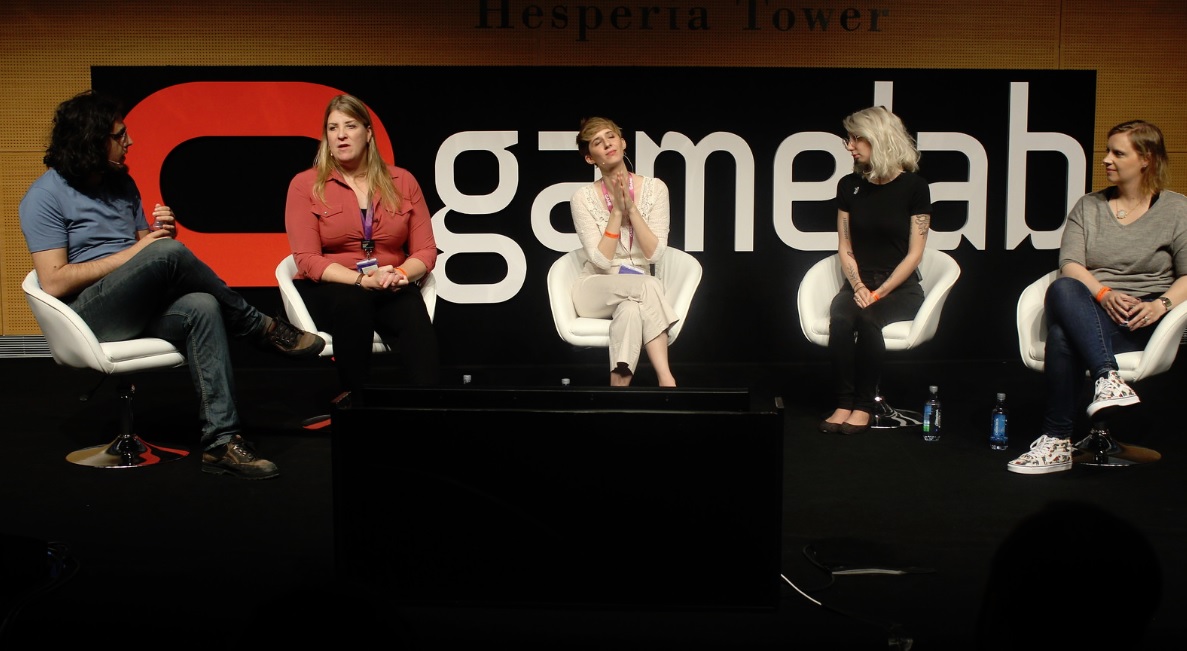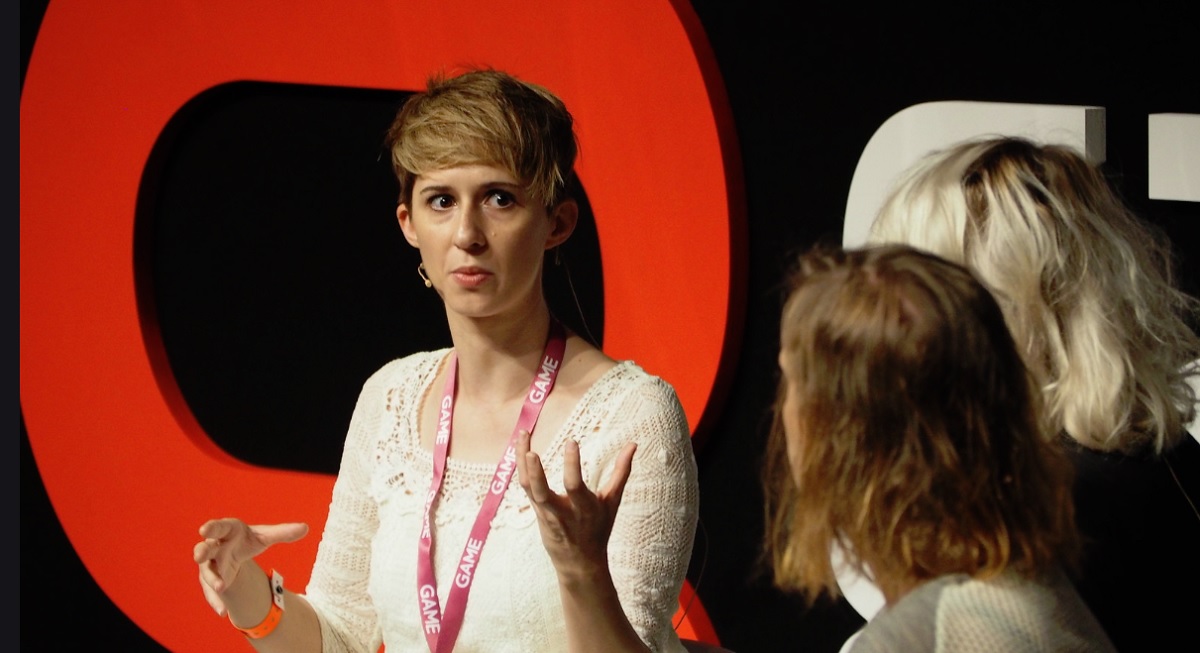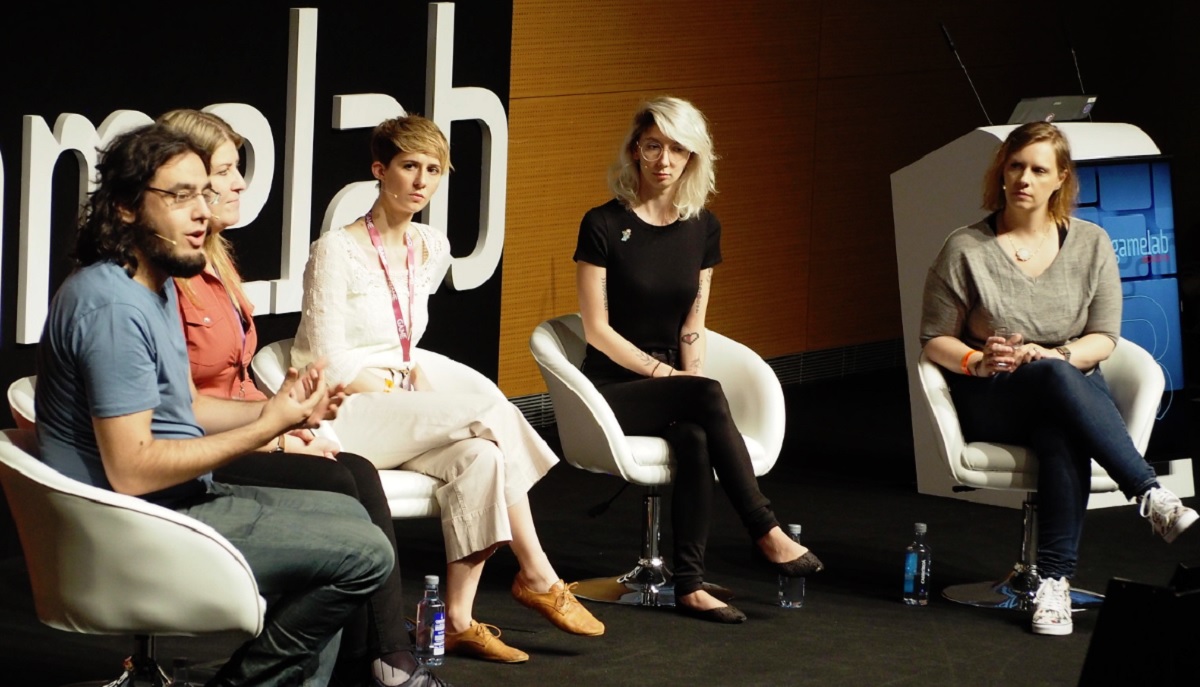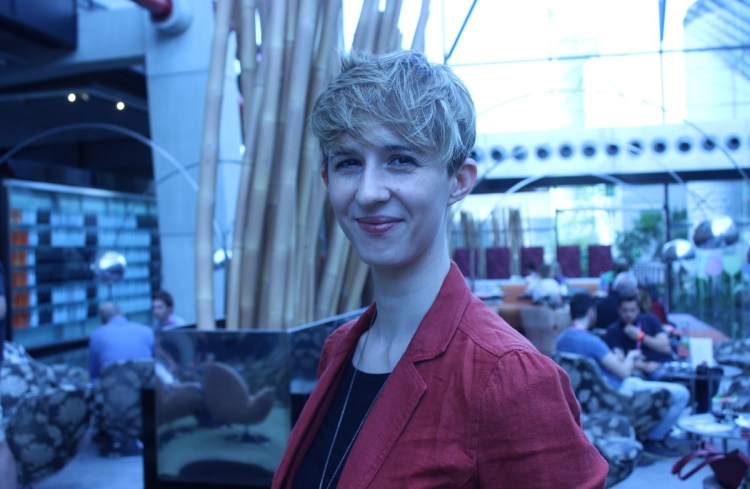When voice actress Sarah Elmaleh helped Rami Ismail create the GameDev.World online-only game development conference — translated into eight languages in real-time — it was only one of a number of things she has undertaken to encourage collaboration in video games.
It’s part of an effort to make the video game industry a more emotionally aware, collaborative, and inspiring, even though it can be a harsh, tough, and competitive.
Her acting is an attempt to bring new kinds of characters and community to video games. She has played roles such as Katie in Gone Home and the Freelancer in BioWare’s Anthem. She has played roles in triple-A titles such as For Honor, Final Fantasy XV, and Call of Duty: Black Ops IV. And she has played roles in indie games such as Pyre, Where the Water Tastes Like Wine, and Galak-Z.
She spoke on a panel on inclusivity at the Gamelab conference in Barcelona. I interviewed her afterward.
June 5th: The AI Audit in NYC
Join us next week in NYC to engage with top executive leaders, delving into strategies for auditing AI models to ensure fairness, optimal performance, and ethical compliance across diverse organizations. Secure your attendance for this exclusive invite-only event.
Here’s an edited transcript of our interview.

Above: Sarah Elmaleh (center) on inclusivity panel at Gamelab
GamesBeat: You’re involved in a lot of things.
Sarah Elmaleh: I guess so!
GamesBeat: What do you think of as the center of what you’re doing?
Elmaleh: I think I’m interested in collaboration. That’s the biggest thing. All the community building I do is about inviting more people to the table, more kinds of people, more disciplines. Everything I would do with the labor union or with actors and developers is about increasing that collaboration, making it more satisfying, more exciting, more happy and safe.
That’s what thrills me as an actor, when it feels like we’re collaborating and communicating and understanding each other’s vision and adding to it freely. If there was a through line through all those activities, that would be it.
GamesBeat: As far as bringing the already-unionized environment of the acting community to games, is that something you think is going to happen, or that you want to happen?
Elmaleh: It’s interesting. Actors occupy a special place in development where we’re not quite developers, but we are part of the development process. We’re both in-group and out-group to the whole community. As an already-organized space — I just feel very grateful for the protections the union has. A union has to stay engaged with its collaborators and its own community to stay relevant, to stay active, but I’m so grateful for the protections I do have that I want to make sure we share that, provide that example, provide that information.
It will be ultimately up to developers to pursue their own destiny and organize in the way that makes the most sense for them. But having that conversation and leaving those lines open is super important. I’m very happy to be available to people who have questions about it or who need to connect to someone in the union when they have a question they need answered.
I’m not actually a legal or labor specialist as far as building a union from scratch. But I think that just showing that this is a way of doing things that’s feasible, that’s possible, that doesn’t diminish creativity, that doesn’t smother business — I’m saying, “We’re available. This is how we live. We’re happy to share with you what we know. If this is something you want to pursue, we’re there to help you.”
GamesBeat: What’s interesting about being at that divide between acting and game development?
Elmaleh: Sometimes there’s a way of talking to each other or working together that’s a bit of a shift to make. There’s a way of looking at voice-over where it’s an asset, and then there’s a way of looking at voice-over where it’s a collaboration. That, sometimes, is the struggle. Especially when, because of the nature of voice-over recording being separate, especially in triple-A, from the rest of the development process, it’s easier and easier to just see it as this file that shows up in your inbox one day so you can put it in the game. As opposed to something that happens — a living, surprising process of creation in the booth with a director that’s part of the game-making process.
That’s the biggest translation effort that I fight for. “Hey, we’re here to add to your vision. We’re here to listen to your vision. We’re adaptable. There’s moments of creativity that you can’t predict and you can’t frce that come when we’re on the same page.” That’s the intersection where there’s the most friction, and that I want to keep growing.
GamesBeat: With voice acting and mocap — it looks like they’re getting so good at mocap that games are becoming much more realistic. Is that kind of full performance something that interests you?
Elmaleh: I did performance capture for Anthem. It’s first-person, although — well, anyway. The thing I think I would advocate for about performance capture is not only the fidelity of it, the fact that you get a full performance in great detail, but the fact that it brings actors together. To me, what excites me most about performance capture is the opportunity to act ensemble with my cast mates, which is something I never get to do in the booth.
Realizing not just that you’re getting someone’s movement, but that movement comes from that actor because we’re sharing a space, because we’re acting with each other, because acting is reacting — to think about performance capture as a process that’s about having your creatives in the same space riffing with each other and creating together in a way that you wouldn’t get otherwise, that’s what’s really special.
The tech and the detail and all of that will come along. All of that’s very good. But you’re getting different performances because we’re in the same room. That’s what I think really matters.

Above: Sarah Elmaleh is a voice actress in both Gone Home and Anthem.
GamesBeat: And you’re acting not only with words, but paying attention to everything your body’s doing.
Elmaleh: Right. Game writers — sometimes there’s a nervousness or a need, a genuine need, to explain a lot in game dialogue. Game dialogue sometimes takes up the burden of explaining gameplay, or explaining what the character is feeling really clearly so that the player doesn’t miss it.
When you have performance capture, you can use words less. You can use your face. You can close distance. Relationships are evident now in how physical bodies are interacting with each other, as much as what we declare to each other. That’s not how human beings are, right? We don’t just say how we feel all the time. We may not even know how we feel all the time. You have more pieces of your instrument to use to show that. It’s fun, and it’s very exciting.
GamesBeat: Do you think some of this will eventually come to indie games as well?
Elmaleh: I think the tech is becoming extremely democratized, very quickly. Even Ninja Theory — they’re a smaller studio, and they were doing not only performance capture, but real time implementation. Unreal had a tech double for their demo at the Unreal keynote at GDC a few years ago, and already at that point….
GamesBeat: You were part of that?
Elmaleh: Yeah, yeah. I was testing for the presentation. But that blew me away. That was inhibited by a really thick cabled connection, but already that’s a small team getting full performance capture with a really dedicated artist. I see no reason why — I fought very hard, actually, to make sure that was included in the low-budget contract. They left out a clause for performance capture, and I was like, “Indies are going to be using this very soon. I think it’s important that we keep that in place.”
GamesBeat: Do you think that would have been interesting for something like Gone Home? It doesn’t have any characters as it is, but….
Elmaleh: Every game is the product of the time it’s made in and the tools that were available. It would be a different game, perhaps. Tacoma also didn’t use performance capture, but Tacoma did an extremely — I was so jealous. Tacoma had an amazing performance process. It was voice only, but they did ensemble recording. All the actors were in the same space, acting very freely with each other. They had props to use. It was a very intuitive, actor-friendly process.
There’s a difference between high-detail process and then actual ways of working that support the creation process as an actor. Something like L.A. Noire had really great face tech, but it was like acting in a vice. There’s that on the one end, where you’re getting all the detail, but what is the actor actually feeling? What can they actually do with it? And then there’s something like Tacoma, which is taking less of the performance, but making the actors more comfortable and getting better performances that way.
That’s the thing. As tech gets further streamlined and democratized or even expanded and evolving, I think the main thing is to remember that your actors also — it’s not just the tech. It’s how you record. It’s how you support your actors. It’s the information you give them. It’s the access they have to each other. All of those things create better performances just from interpretation and from artistry.

Above: Sarah Elmaleh, center, at the Gamelab event.
GamesBeat: It seems like a good thing for whatever causes you have. It seems to be about making people care more.
Elmaleh: It’s caring from — I mean, I’m greedy. I think of it as a player and as a collaborator. For me, what excites me is collaboration. What excites me are new, surprising, heartfelt games. Everything I do, I’m listening to find those games. I’m listening as a human obligation, but also as a creative hunger for new people in this space, for everyone’s creativity to be expressed. I’m a big believer that different — less that games have a pure form, and more that they expand by coming into contact with other forms. For me it’s all greed. [laughs] It’s all pure greed.
GamesBeat: What got you excited about GameDev.World?
Elmaleh: At the time I was working as IndieCade’s game-maker relations. I was the single bottleneck between the festival and all of the developers that were showing in the festival. We had one Japanese developer, one person who particularly struggled with English, and just the logistical difficulty of me sending out what I hoped was a really clear, thorough email in complicated English was so massively difficult for him. That year I was particularly sensitive to the fact that — we considered ourselves a diverse showcase of games, but there was friction for this person around the barrier of language.
That timing happened to coincide with Rami Ismail writing a blog post about the language barrier in games, and the fact that the game development discussion, game development academia — the knowledge base was locked in English. The community was locked in English. I read that article and had just had this experience, so that was when I asked Rami, “Can we do something about this? I don’t know what that is, but I bet you do.” And he said, “I do!” That was how GameDev.World was born.
We founded it together. It came about — Rami conceptualized the conference. It’s his vision and it wouldn’t exist without him. But it was kind of sparked in a conversation that we had after that experience working with IndieCade.
GamesBeat: What do you think looks like a better world compared to what we have now?
Elmaleh: It’s more kinds of games that come from different sources of inspiration, whether that’s people or art forms or experiences. It’s a feeling that everyone on a team has something to add to it creatively, as well as just in a service capacity. It’s the sense that play is free and open, and it’s added to by all kinds of people.
It’s happening. It’s very much happening. So much of my education about identities and perspectives has come from games Twitter, of all places. Sometimes it’s a difficult learning experience, as we were all saying. It takes courage and patience and an ability to both be corrected and give correction. But it looks like a place with more games, more people making them, and more people enjoying them.
GamesBeat: The game industry seems like this harsh, competitive, capitalistic environment, but it seems like you’re trying to make it a bit more emotionally aware.
Elmaleh: [laughs] I guess so! There’s always a tension between — I come out of indies. I moved to Los Angeles to work in triple-A because there were people doing wonderful, inspiring work that I really wanted to work with. But indies are my background and my love. That’s why I was so passionate about the low-budget contract. I wanted to join my union, but I don’t want to leave indies behind. I believe they’re the most experimental, exciting people and creators.
It’s an art form. There’s a tension in anything like this. There’s big business even in fine art. There’s big business in film. But it’s also an art form. Giving creators the space the freedom to talk about subjects that aren’t financially viable, or that aren’t in line with a marketing mandate — that’s the thing. That belief that games are an art form and that we connect with human beings through it. We create joy and insight through games. That’s why that’s my special crusade.
Disclosure: The organizers of Gamelab paid my way to Barcelona. Our coverage remains objective.


